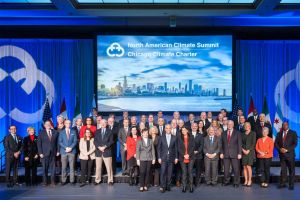It is in the hands of mayors, working with their residents and local leaders, to drive concrete solutions to climate change.
Key Findings
On December 4–5, 2017, the City of Chicago hosted the North American Climate Summit in partnership with C40 and the Global Covenant of Mayors for Climate and Energy. This was the first time a US climate summit convened following President Donald Trump’s decision to withdraw the United States from the Paris Agreement. Featuring remarks from former President Barack Obama, the summit brought together mayors from around the world to define collective, city-level actions and commitments to combat climate change. At the time of this publication, upward of 70 cities have signed the Chicago Climate Charter, affirming their commitment to address climate change within their cities.
There is no greater existential risk to humanity than that posed by the ongoing and dramatic changes to our planet’s climate. Increased temperatures, extreme weather events, and rising sea levels are already affecting human health and economic vitality. It is also increasingly clear that anthropogenic causes are to blame for the damaging shifts being wrought on our environment. Unfortunately, national governments have been slow to respond to this unfolding disaster.
This report contextualizes the North American Climate Summit in the broader arc of climate action, outlines the commitments made by signatories to the Chicago Climate Charter, and provides recommendations for cities seeking to accelerate their sustainability efforts. All signatories committed to the following:
- Reduce greenhouse gas emissions by a percentage equal to or exceeding their home nation’s commitment
- Track, measure, and report the data
- Empower cities through collective action
- Engage all communities, especially nontraditional voices, in policy formation
- Integrate climate risks into infrastructure and emergency planning
- Support polices and actions that incorporate the cost of carbon and support those most affected
- Partner broadly for robust solutions
Additionally, the charter provided cities the opportunity to sign customizable commitments around renewable energy, embodied carbon, mobility, sustainable transportation, waste management, and green space to deliver results in their cities.
Turning the tide on climate change will take time. The good news is that cities continue to recognize their capacity and responsibility to lead on climate issues. The road to achieving the goals of the Paris Agreement is long, but it runs through the Chicago Climate Charter.
